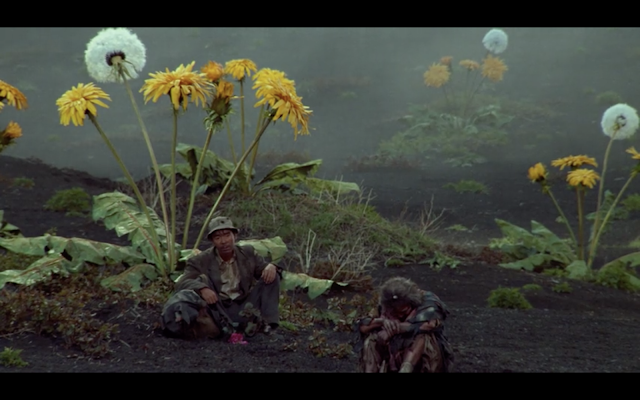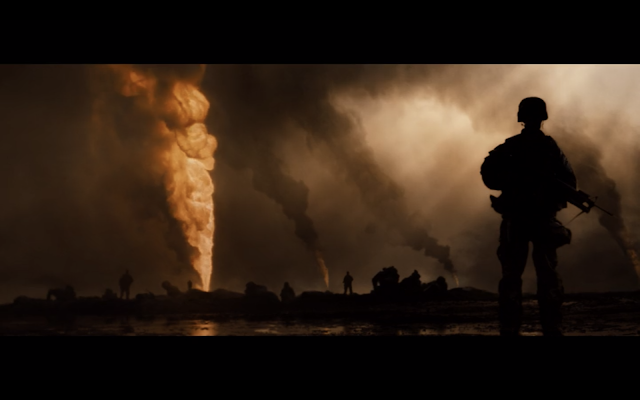Dreams (1990)
One of Akira Kurosawa's later films, Dreams is a very hard movie to discuss, let alone review. It's a strange yet beautiful look at the surreal nature of our subconscious thought while also covering a broad range of themes. Beneath this movie's beauty is a tempered warning of humanity's destruction of the natural world we reside in. The movie has no central plot, rather, it relies on eight dreams that Kurosawa had, tied together by its central theme of a natural force at work. The dreams stretch from an apocalyptic hellscape to a beautiful village of watermills.
I struggle to write a review on this film like my past reviews. It's not possible to fully theorize each of the dreams as it's incredibly ambiguous and allows for endless interpretation. Perhaps they weren't meant to be interpreted literally, rather meant to be observed and their themes pondered on much like when Kurosawa first dreamt them. The dreams are deeply personal to Akira, with the main character being a direct stand-in for the director, even wearing his signature hat. Each dream has some form of beauty, varying from peaceful energy to a subdued rage against mankind. The dreams cover areas of death, guilt, hell, technology, childhood, nature, and how humanity fits into each of those areas.
Throughout the movie, we see Kurosawa get lost into his dreams with the viewer equally adrift in his world. In the dream Crows, we see him literally become a part of the painting where the trees turn to brushstroke as he hurdles deeper into Van Goph's work. When this movie works, it's brilliant and utterly absorbing. However, when it doesn't work, it really flops, barely able to maintain my attention and begging you to keep watching. But Dreams isn't for everyone, it's a slow movie that has no plot. It's a movie that asks a lot of its audience as there isn't a protagonist to relate to. Kurosawa's surrogate is a stand-in for the viewer rendering him a passive, faceless character. The only dream where he had a real voice was The Tunnel, where we see Kurosawa's regrets in World War II manifest itself in the lost platoon of soldiers. Kurosawa was denied due to health issues and by the time he was drafted the war had ended. The Tunnel depicts this regret for his inability to fight for his country and to all those who perished in the war.
In all of the dreams, Akira has an underlying theme that is either well crafted and seamless or glaringly obvious and tiresome. I loved Crows, Village of the Watermills, The Tunnel, The Peach Orchard, and Sunshine Through the Rain as each had so much substance and were intricately crafted self-contained stories. Yet, I found The Blizzard, The Weeping Demon, and, particularly, Mount Fiji in Red very messy. I also found their themes to be far too on the nose or obvious that creates tedious, and dull viewing for the audience.
It's fitting that Dreams starts with a marriage and ends with a funeral. It's also fitting that we start with Kurosawa as a young boy and end with a fully grown Kurosawa meeting an elderly man who wishes for humanity to return to a more naturalistic way of life. The old man standing in for Kurosawa's hope and dreams for the future of mankind. The final dream is hopeful despite the movie's bleak nihilism in such dreams as The Weeping Demon and Mount Fuji in Red. In the final dream, Village of the Watermills, we are introduced to a town that doesn't harness nature but coexists with it. It's a beautiful breath of fresh air that is Kurosawa's way of saying there's hope yet for humanity, all we really need is "clean air and clean water". Ultimately, Dreams is an ode to nature and a call for humanity's return towards it.
Dreams is not an easy watch, as it's slow, disproportionate, and it's easy to find yourself distracted. But Dreams is also unbelievably beautiful with stills evoking feelings of profound emotion and the gratifying feeling of nature's sublime. Although vastly different from Kurosawa's other works, Dreams is deserving of recognition and has cemented itself a place in my heart. It's a movie that upon first viewing I thought very little of but the more I think about it the further it burrows deeper into fondness.
- GL
8 / 10
(Above) My favorite shot:
(Below) Runners-up:














Comments
Post a Comment